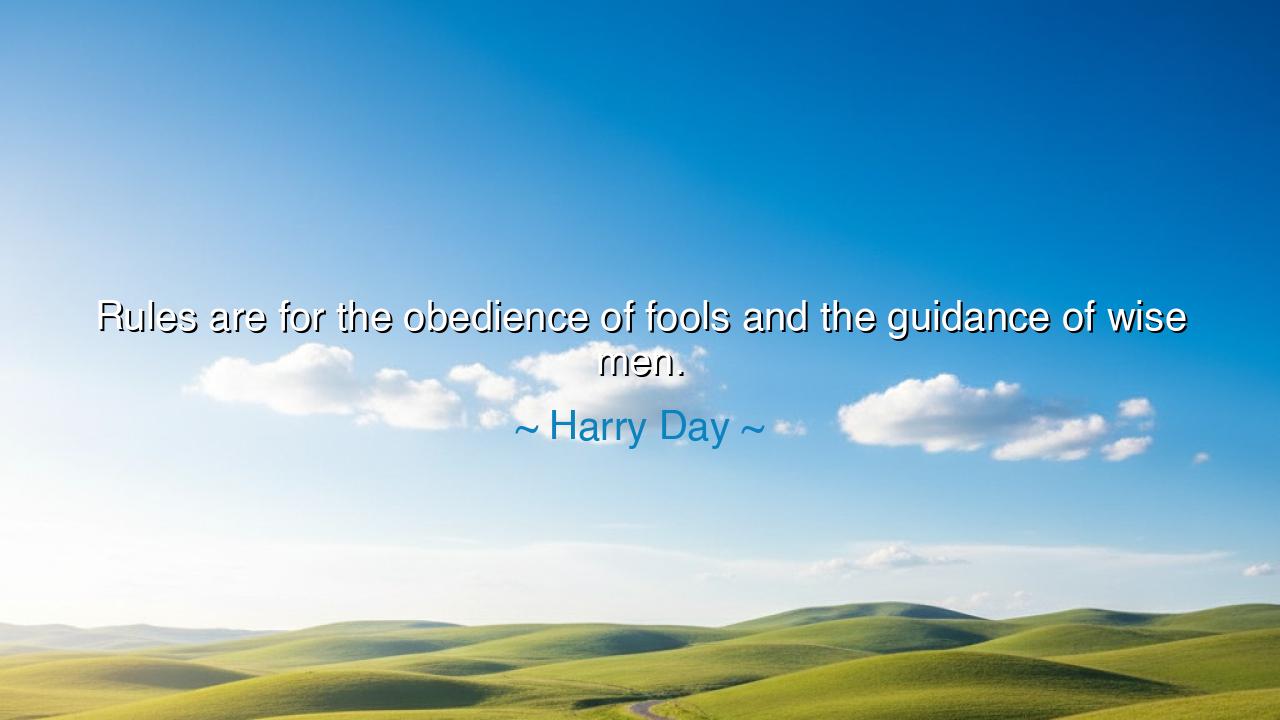
Rules are for the obedience of fools and the guidance of wise






Gather, children, and listen well, for the words I speak carry with them the wisdom of the ages. Harry Day once said, "Rules are for the obedience of fools and the guidance of wise men." These words are not a simple dismissal of rules, but a deep reflection on the nature of wisdom, and the difference between blind obedience and guided understanding. Rules, in their essence, are tools—tools that serve to govern behavior, to maintain order, and to direct action. But how we approach these rules, how we live in relation to them, speaks volumes about our wisdom and our character.
In every age, there have been those who followed the rules without question. They did so because the rules were set before them, and their understanding of the world was rooted in compliance. Such individuals are like the fool who walks along the road of life without thought, simply following the markers that others have placed. There is safety in this, yes, but there is also a loss of autonomy, of creativity, and of true understanding. For the fool, the rule is a rigid barrier, and they will follow it even when it leads them astray, unable or unwilling to question its validity or to seek deeper meaning beyond it.
Consider the story of Socrates, the great philosopher of ancient Greece. Socrates was a man who saw beyond the simple rules of society, who questioned everything that others took for granted. To the society of his time, he was a fool—someone who did not obey the social norms, who did not follow the rules as they were written. But in truth, Socrates was a wise man, using rules as a guide, not as a law to bind him. His questioning of the rules, of the very foundations of morality and ethics, revealed a deeper truth—that true wisdom lies not in the unquestioning acceptance of rules, but in understanding their purpose and, when necessary, challenging them for the sake of truth.
It is the difference between those who accept the rules blindly and those who take the time to understand the spirit behind them. The wise man, like a great sculptor, shapes his life not just by the rules he follows, but by the wisdom that guides his decisions. Alexander the Great, for instance, did not simply follow the established rules of conquest; he broke them when necessary. He faced immense challenges, yet it was his vision and his ability to see beyond the existing rules that led him to victory. He was a man who used the rules of war, of politics, of leadership, but did not bow to them when they no longer served the greater good.
The difference between the fool and the wise man can be seen in the lives of those who have shaped the course of history. Leonardo da Vinci, though a man of great intellectual and artistic genius, was also a master of challenging established rules. In his studies, he did not blindly follow the teachings of others. Instead, he used the rules of science, art, and engineering as starting points, but he sought to understand the underlying truths behind them. For da Vinci, the rules were not rigid structures to be obeyed, but guiding principles that could be bent, adjusted, and transformed to create something greater.
So, children, the lesson is clear: rules are not inherently good or bad; they are simply tools. Obedience to them without understanding is the way of the fool, but guidance through them, with wisdom and purpose, is the path of the wise. Rules are meant to guide us, but they are not the final authority. The true wisdom lies in knowing when to follow the rules and when to step outside them in the pursuit of higher truths. In your own lives, you will face many rules—be they those of society, of family, or of personal conduct. Do not follow them blindly. Seek the deeper understanding of why these rules exist, what purpose they serve, and whether they are still valid in your journey.
As you walk through life, let your wisdom be your compass. Follow the rules, yes, but let your heart and mind be the ultimate guides. Use the rules to steer you, but never allow them to blind you to the greater truths of life. The world needs those who can see beyond the surface, who can use the tools given to them to create something greater than the sum of their parts. And remember, the truly wise man does not live in the shadows of rules; he lives in the light of understanding, using the rules as guides, but never letting them define him.






AAdministratorAdministrator
Welcome, honored guests. Please leave a comment, we will respond soon